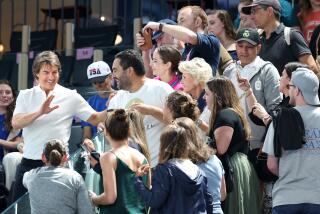Anita DeFrantz is still pulling an oar for the Olympic movement
LONDON — Anita DeFrantz was making her rounds here Wednesday morning. Think of her as the den mother of the Olympic Games.
“I used to get to every sport, every venue,” she said. “But here, I spent the first week at rowing, and that was kind of far away.”
She was there as vice president of the International Rowing Federation, one of dozens of international sports organizations of which she holds, or has held, membership and influence.
PHOTOS: London Olympics, Day 12
The rowing is close to her heart on several levels. She won a bronze medal in the women’s eights in Montreal in 1976, and it started her on a path of Olympic service that she enjoys immensely today and wears like a pair of comfortable shoes. Part of her duties at rowing included presenting medals. One presentation reminded her of why she loves what she does.
She presented the gold medal to Britain’s Katherine Grainger, who won the double sculls with teammate Anna Watkins. The smile exchanged between DeFrantz and Grainger went well beyond the usual happy-face protocol.
“I was at the World Games in rowing in Scotland, right after the ’96 Olympics,” DeFrantz said. “When we present the medals, we have a volunteer carrying them on a tray alongside us. That day, after I presented the medal, I turned to my volunteer and said, for no particular reason, ‘Someday, I’ll present a gold medal to you.’”
That volunteer was Grainger, who won silver medals in the next three Olympics. Last week, she got her gold from the woman who had promised her one 16 years ago.
“I still have no idea why I said that to her,” DeFrantz said. “I never do that.”
DeFrantz is the senior member of the International Olympic Committee from the United States. She is 59, was named to the IOC in 1986, just five years after the good-old-boys club had included its first female. Now, there are 23 women out of a membership of 109.
Her bronze medal in Montreal led to a quest for a gold, which led to hard years of training to get ready for the 1980 Olympics in Moscow, which led to her shock and chagrin when President Carter ordered an Olympic boycott as a response to Russia’s invasion of Afghanistan. When the boycott stuck, DeFrantz sued, lost the suit but gained the attention of both the L.A. Olympic Organizing Committee for the ’84 Games and the IOC itself.
She moved to L.A. as a vice president of the LAOOC and never left. She was so much the vocal leader of the athletes anti-boycott that, years later at a dinner, she ran into Carter, who said, “Anita, are you still mad at me?”
When it came time for payoff by the IOC to Los Angeles organizers, the logical choice for IOC membership, Peter Ueberroth, got swallowed up in Olympic politics and DeFrantz, with Ueberroth’s blessings, got the spot.
“If Peter had been treated fairly,” DeFrantz said, “you and I would not be sitting here, talking.”
She also said, “I’ve had a lot of great opportunities in life, and thank goodness I recognized they were great opportunities.”
She served a four-year term, starting in 1997, as the first female vice president of the IOC. She announced recently that she was running for another four-year term, but decided to withdraw. She recognizes internal politics and knows when to hold ‘em and when to fold ‘em.
She sat quietly in the daily press briefing of the London organizing committee, just observing while reporters from around the world asked about reports of fake bombs and missing Cameroon athletes. Had they known who she was, many wouldn’t have let public relations people from the London committee make the news while an influential IOC newsmaker sat in their midst.
DeFrantz is a lawyer and is president of the LA84 Foundation, which continues to fund sports programs in the L.A. area with the $94-million legacy Ueberroth and his LAOOC left. She said, “I’m not a politician, I’m an advocate.”
She favors the Olympic inclusion of high-profile dream teams and tennis pros, “because our athletes do,” she said. “They tell us they come to win a gold medal and want to do that against the best.”
She said the IOC is the board of directors of world sport and added, “I truly believe in the power of the Olympic movement.”
Then, practicing what she preaches, she set out again to visit, observe and advocate.
More to Read
Go beyond the scoreboard
Get the latest on L.A.'s teams in the daily Sports Report newsletter.
You may occasionally receive promotional content from the Los Angeles Times.








